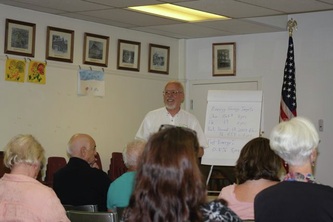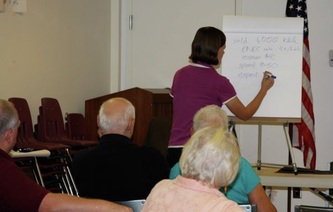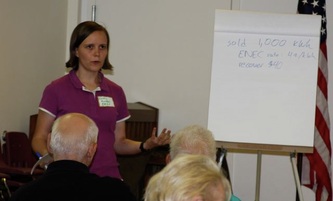The forum was well attended and the audience got all fired up when they heard that FirstEnergy/Potomac Edison, as required by stipulations in their merger settlement, is proposing an ineffective Energy Efficiency Program in West Virginia that is much weaker than programs FirstEnergy is required to comply with in neighboring states. The program will be paid for by residential consumers, including its marketing and administrative costs and reimbursement for resulting lower sales revenue to the company. Benefits offered to consumers via the program are extremely limited. Their program offers assistance to commercial/industrial customers with upgrading lighting (although this class of customers will not contribute to the cost of the program in their rates). It also offers free CFL bulbs and faucet aerators for low-income residential customers. That's it -- there's nothing in it for the rest of the residential customers who will finance this program through new rate increases. In fact, the audience was so outraged and motivated, several checked back in with me on the way out to make sure we had their e-mail address for future calls to action. Even if you missed the meeting, we're still asking you to take action detailed below.
Now that I've given you the punch line first, here's the background that we covered last night. We explained how a regulated utility systems works and the mission and procedures of the PSC in a rate case. Next we explained how the FirstEnergy subsidiaries operate in the state -- how electricity gets to your house and where it comes from. Cathy Kunkel of EEWV gave a very informative talk explaining the ratemaking process, the different types of rate cases, why rates have increased over 30% in the past couple of years (the cost of coal!), and informed us that Potomac Edison & Mon Power will be filing for another rate increase next month. Mike Harman of EEWV talked with the audience about energy efficiency measures and how they can dramatically reduce electric bills. If FirstEnergy had a more effective program that helped more consumers with energy efficiency measures, even those who did not participate would benefit through lower bills. As long as our consumption of electricity continues to rise, we are subject to higher costs to purchase peak power and the cost to build additional generation plants and transmission lines. If we can reduce our use overall, we can avoid higher prices because the cheapest power plant and transmission lines are the ones that FirstEnergy doesn't have to build. Mike also introduced the concept of demand response, where consumers of large amounts of power agree to lower their usage at times of peak demand in exchange for payments from the power company. He shared many success stories of West Virginia businesses and school systems who have scored big financial benefits from energy efficiency and demand response programs. He compared FirstEnergy's program goals in West Virginia with those FirstEnergy is required to comply with in neighboring states, which shocked the audience about what FirstEnergy is trying to get away in this state.
Cathy wrapped things up with a call to action for all Potomac Edison and Mon Power customers:
- Read more about this issue here.
- Send a letter to the Public Service Commission asking them to order FirstEnergy to bring their proposed program in line with standards and benefits offered in other states.
Additional meetings are being planned around the state this fall. The next meeting will be in Lewisburg, at City Hall, on August 31 at 7:00 p.m. Check out the complete meeting schedule here. If you'd like to attend another meeting offered in the Eastern Panhandle, let EEWV and the Coalition know!
Here's a link to The Journal's article about the forum. The meeting was also covered by WEPM radio.



 RSS Feed
RSS Feed